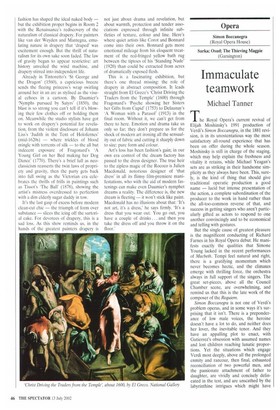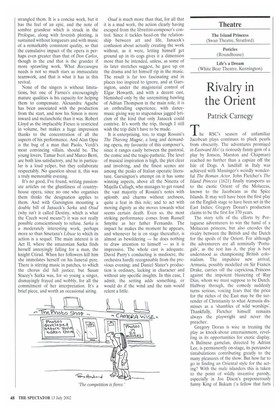Opera
Simon Boccanegra (Royal Opera House) Sarka; Osud; The Thieving Magpie (Garsington)
Immaculate teamwork
Michael Tanner
The Royal Opera's current revival of Elijah Moshinsky's 1991 production of Verdi's Simon Boccanegra, in the 1881 revision, is in its unostentatious way the most satisfactory all-round experience that has been on offer during the whole season. Moshinsky is still in charge of the staging, which may help explain the freshness and vitality it retains, while Michael Yeagan's sets are as striking in their handsome simplicity as they always have been. This, surely, is the kind of thing that should give traditional operatic production a good name — lucid but intense presentation of the action, a complete subordination of the producer to the work in hand rather than the all-too-common reverse of that, and success in getting singers who aren't particularly gifted as actors to respond to one another convincingly and to be economical and telling with gestures.
But the single cause of greatest pleasure is the magnificent conducting of Richard Fames in his Royal Opera debut. He manifests exactly the qualities that Simone Young lacked in the recent performances of Macbeth. Tempi feel natural and right, there is a gratifying momentum which never becomes hectic, and the climaxes emerge with thrilling force, the orchestra always in full support of the singers. The great set-pieces, above all the Council Chamber scene, are overwhelming, and remind us that this is the late work of the composer of the Requiem.
Simon Boccanegra is not one of Verdi's problem operas, and in some ways it's surprising that it isn't. There is a preponderance of low male voices, the heroine doesn't have a lot to do, and neither does her lover, the inevitable tenor. And they have an appalling plot to enact, with Gutierrez's obsession with assumed names and lost children reaching lunatic proportions. Yet the situations which engage Verdi most deeply, above all the prolonged enmity and rancour, then final, exhausted reconciliation of two powerful men, and the passionate attachment of father to daughter, are vividly and concisely delineated in the text, and are unscathed by the labyrinthine intrigues which might have
strangled them. It is a concise work, but it has the feel of an epic, and the note of sombre grandeur which is struck in the Prologue, along with feverish plotting, is sustained without longueurs and with music of a remarkably consistent quality, so that the cumulative impact of the opera is perhaps even greater than that of Don Carlos, though in the end that is the grander if more sprawling work. What Boccanegra needs is not so much stars as immaculate teamwork, and that is what it has in this revival.
None of the singers is without limitations, but one of Farnes's encouragingly mature qualities is his capacity for helping them to compensate. Alexandru Agaehe has been associated with the production from the start, and now his Simon is more inward and melancholic than it was. Robert Lloyd as the implacable Fiesco is restricted in volume, but makes a huge impression thanks to the concentration of all the aspects of his performance. And Alan Opie is the bug of a man that Paolo, Verdi's most convincing villain, should be. The young lovers, Tamar Iveri and Marco Berti, are both less satisfactory, and he in particular is a loud yelper, but they collaborate respectably. No question about it, this was a truly memorable evening.
It's no good, I've found, writing passionate articles on the ghastliness of countryhouse opera, since no one who organises them thinks the designation applies to them. And with Garsington mounting a double bill of Janacek's Sarka and Osud (why isn't it called Destiny, which is what the Czech word means?) it was not really possible conscientiously to refuse. Sarka is a moderately interesting work, perhaps more so than Smetana's Libuse to which its action is a sequel. The main interest is in Act II, where the amazonian Sarka finds herself annoyingly falling for a man, the knight Ctirad. When her followers kill him she immolates herself on his funeral pyre. There is stirring music in patches, to which the chorus did full justice; but Susan Stacey's Sarka was, for so young a singer, dismayingly frayed and wobbly, for all the commitment of her interpretation. It's a brief piece, and worth an occasional airing. Osud is much more than that, for all that it is a mad work, the action clearly having escaped from the librettist-composer's control. Since it tackles head-on the relationship between art and life, Janacek's confusion about actually creating the work without, as it were, letting himself get ground up in its cogs gives it a dimension more than he intended, unless, as some of its later stretches suggest, he gave up on the drama and let himself rip in the music. The result is far too fascinating and in places too inspired to ignore, and at Garsington, under the magisterial control of Elgar Howarth, and with a decent cast, blemished only by the unremitting bawling of Adrian Thompson in the main role, it is an enthralling experience, with dancemusic giving way to stupendous jagged lyricism of the kind that only Janacek could contrive, It's worth the trip, though I still wish the trip didn't have to be made.
It is enterprising, too, to stage Rossini's The Thieving Magpie, a long and demanding opera, my favourite of this composer's, since it ranges easily between the pastoral, the comic and the tragic-pathetic. The level of musical inspiration is high, the plot clear and involving, and the finest scenes are among the peaks of Italian operatic literature. Garsington's attempt on it has some winning aspects, above all the Ninetta of Majella Cullagh, who manages to get round the vast majority of Rossini's notes with aplomb, and charms without archness, quite a feat in this role; and to act with moving dignity as she moves towards what seems certain death. Even so, the most striking performance comes from Russell Smythe as her father Fernando. The impact he makes the moment he appears, and whenever he is on stage thereafter, is almost as bewildering — he does nothing to draw attention to himself — as it is impressive. The whole cast is adequate. David Parry's conducting is mediocre, the orchestra hardly recognisable from the previous evening; and Daniel Slater's production is ordinary, lacking in character and without any specific insights. In this case, I admit, the setting adds something, or would do if the wind and the rain would relent a little.



































































 Previous page
Previous page